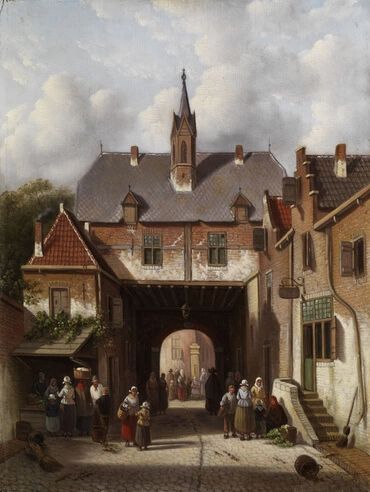1
กรุงที่คับคั่งด้วยพลเมืองมาอ้างว้างอยู่ได้หนอ กรุงที่รุ่งเรืองอยู่ท่ามกลางประชาชาติมากลายเป็นดั่งหญิงม่ายหนอ กรุงที่เป็นดั่งเจ้าหญิงท่ามกลางเมืองทั้งหลายก็กลับเป็นเมืองขึ้นเขาไป
2
กรุงนั้นร่ำไห้สะอื้นในราตรีกาล และน้ำตาของเธอก็อาบแก้ม เธอจะหาใครท่ามกลางคนที่รักเธอให้มาปลอบเธอก็หาไม่พบ บรรดาพวกเพื่อนของเธอสิ้นทุกคนได้ทรยศต่อเธอ เขาทั้งปวงกลับเป็นศัตรูของเธอ
3
ยูดาห์ได้ถูกกวาดไปเป็นเชลย ได้รับความทุกข์ใจ ต้องทำงานอย่างทาส เธอต้องพำนักอยู่ท่ามกลางประชาชาติทั้งหลาย เธอไม่พบที่หยุดพักสงบเลย บรรดาผู้ข่มเหงได้ไล่ทันเธอเมื่อเวลาเธอทุกข์ใจ
4
ถนนหนทางที่เข้าเมืองศิโยนก็คร่ำครวญอยู่ เพราะไม่มีผู้ใดเดินไปในงานเทศกาลที่เคร่งครัดทั้งหลายนั้น บรรดาประตูเมืองของเธอก็รกร้างเสียแล้ว พวกปุโรหิตของเธอได้พากันถอนใจ สาวพรหมจารีทั้งหลายของเธอก็ต้องทนทุกข์ และตัวเธอเองก็ได้รับความขมขื่นยิ่งนัก
5
พวกคู่อริของเธอกลายเป็นหัวหน้า พวกศัตรูของเธอได้จำเริญขึ้น ด้วยว่าพระเยโฮวาห์ได้ทรงกระทำให้เธอทนทุกข์ เพราะความทรยศอันมหันต์ของเธอ ลูกเต้าทั้งหลายของเธอตกไปเป็นเชลยต่อหน้าคู่อริ
6
และความโอ่อ่าตระการได้พรากไปจากธิดาแห่งศิโยนเสียแล้ว พวกเจ้านายของเธอก็กลับเป็นดุจฝูงกวางที่หาทุ่งหญ้าเลี้ยงชีวิตไม่ได้ และได้วิ่งป้อแป้หนีไปข้างหน้าผู้ไล่ติดตาม
7
เยรูซาเล็มเมื่อตกอยู่ในยามทุกข์ใจและยามลำเค็ญก็ได้หวนระลึกถึงสิ่งประเสริฐที่ตนเคยมีในครั้งกระโน้น เมื่อพลเมืองของเธอตกอยู่ในมือของคู่อริ และหามีผู้ใดจะสงเคราะห์เธอไม่ พวกคู่อริเห็นเธอแล้วก็เยาะเย้ยวันสะบาโตทั้งหลายของเธอ
8
เยรูซาเล็มได้ทำบาปอย่างใหญ่หลวง เหตุฉะนี้เธอจึงถูกไล่ออก บรรดาคนที่เคยให้เกียรติเธอก็ลบหลู่เธอ เพราะเหตุเขาทั้งหลายเห็นความเปลือยเปล่าของเธอ เออ เธอเองได้ถอนใจยิ่งและหันหน้าของเธอไปเสีย
9
มลทินของเธอก็กรังอยู่ในกระโปรงของเธอ และเธอหาได้คำนึงถึงอนาคตของเธอไม่ ดังนั้นเธอจึงได้เสื่อมทรามลงเร็วอย่างน่าใจหาย เธอก็ไม่มีผู้ใดจะเล้าโลม "ข้าแต่พระเยโฮวาห์ ขอทอดพระเนตรความทุกข์ใจของข้าพระองค์ เพราะพวกศัตรูได้พองตัวขึ้นแล้ว"
10
พวกศัตรูได้ยื่นมือของเขายึดเอาบรรดาของประเสริฐของเธอ ด้วยเธอได้เห็นบรรดาประชาชาติบุกรุกเข้ามาในสถานบริสุทธิ์ของเธอ คือคนที่พระองค์ได้ทรงห้ามไม่ให้เข้ามาในชุมนุมชนของพระองค์
11
บรรดาพลเมืองของเธอได้ถอนใจใหญ่ เขาทั้งหลายเสาะหาอาหาร และพวกเขาได้เอาของประเสริฐของตัวออกแลกอาหารกิน เพื่อจะได้ประทังชีวิต "ข้าแต่พระเยโฮวาห์ ขอทรงทอดพระเนตรและพิจารณา เพราะข้าพระองค์เป็นที่เหยียดหยามเสียแล้ว"
12
"ดูก่อน ท่านทั้งหลายที่เดินผ่านไป ท่านไม่เกิดความรู้สึกอะไรบ้างหรือ ดูเถิด จงดูซิว่ามีความทุกข์อันใดบ้างไหมที่เหมือนความทุกข์ที่มาสู่ข้าพเจ้า เป็นความทุกข์ซึ่งพระเยโฮวาห์ได้ทรงกระทำแก่ข้าพเจ้าในวันที่พระองค์ทรงกริ้วข้าพเจ้าอย่างเกรี้ยวกราดนั้น
13
พระองค์ได้ทรงส่งเพลิงลงมาจากเบื้องบนให้เข้าไปเหนือกระดูกทั้งหลายของข้าพเจ้า และเพลิงนั้นก็มีชัยชนะต่อกระดูกเหล่านั้น พระองค์ได้ทรงกางตาข่ายไว้ดักเท้าของข้าพเจ้า พระองค์ได้ทรงกระทำให้ข้าพเจ้าต้องหันกลับ พระองค์ได้ทรงกระทำให้ข้าพเจ้าโดดเดี่ยวอ้างว้าง และอ่อนระอาตลอดทั้งวัน
14
แอกแห่งการละเมิดทั้งมวลของข้าพเจ้าก็ถูกรวบเข้าโดยพระหัตถ์ของพระองค์ทรงรวบมัดไว้ แอกนั้นรัดรึงรอบคอข้าพเจ้า พระองค์ได้ทรงกระทำให้กำลังข้าพเจ้าถอยไป องค์พระผู้เป็นเจ้าได้ทรงมอบข้าพเจ้าไว้ในมือของเขาทั้งหลาย ซึ่งข้าพเจ้าไม่สามารถต่อต้านได้
15
องค์พระผู้เป็นเจ้าได้ทรงเหยียบบรรดาผู้มีกำลังแข็งแกร่งของข้าพเจ้าไว้ใต้พระบาทท่ามกลางข้าพเจ้า พระองค์ได้ทรงเกณฑ์ชุมนุมชนเข้ามาต่อสู้ข้าพเจ้า เพื่อจะขยี้ชายฉกรรจ์ของข้าพเจ้าให้แหลกไป องค์พระผู้เป็นเจ้าได้ทรงย่ำบุตรสาวพรหมจารีแห่งยูดาห์ ดั่งเหยียบผลองุ่นลงในบ่อย่ำองุ่น
16
เพราะเรื่องเหล่านี้ข้าพเจ้าจึงร้องไห้ นัยน์ตาของข้าพเจ้า เออ นัยน์ตาของข้าพเจ้ามีน้ำตาไหลลงมา เพราะผู้ปลอบโยนที่ควรจะปลอบประโลมใจข้าพเจ้าก็อยู่ไกลจากข้าพเจ้า ลูกๆของข้าพเจ้าก็โดดเดี่ยวอ้างว้าง เพราะพวกศัตรูได้ชัยชนะ"
17
เมืองศิโยนได้เหยียดมือทั้งสองออก แต่ก็ไม่มีใครที่เล้าโลมเธอได้ พระเยโฮวาห์ทรงมีพระบัญชาเรื่องยาโคบว่า ให้พวกคู่อริล้อมยาโคบไว้ เยรูซาเล็มเป็นดั่งผู้หญิงเมื่อมีประจำเดือนท่ามกลางเขาทั้งหลาย
18
"พระเยโฮวาห์ทรงชอบธรรมแล้ว เพราะข้าพเจ้าได้กบฏต่อพระบัญญัติของพระองค์ ดูก่อนบรรดาชนชาติทั้งหลาย ข้าพเจ้าขอท่านได้ฟังและขอมามองดูความทนทุกข์ของข้าพเจ้า สาวพรหมจารีของข้าพเจ้า และหนุ่มๆของข้าพเจ้าตกไปเป็นเชลยแล้ว
19
ข้าพเจ้าได้ร้องเรียกบรรดาคนรักของข้าพเจ้า แต่เขาทั้งหลายได้หลอกลวงข้าพเจ้า พวกปุโรหิตและพวกผู้ใหญ่ของข้าพเจ้าก็ตายที่กลางเมือง ขณะเมื่อเขาออกหาอาหารเพื่อประทังชีวิตของตน
20
ข้าแต่พระเยโฮวาห์ โปรดทอดพระเนตร เพราะข้าพระองค์มีความทุกข์ จิตใจของข้าพระองค์มีความทุรนทุราย จิตใจของข้าพระองค์ยุ่งเหยิงเพราะข้าพระองค์มักกบฏอย่างร้ายกาจ นอกบ้านมีคนต้องคมดาบตาย ในบ้านก็เหมือนมฤตยู
21
เขาทั้งหลายได้ยินว่า ข้าพระองค์ถอนใจอย่างไร หามีผู้ใดปลอบโยนข้าพระองค์ไม่ บรรดาศัตรูของข้าพระองค์ได้ยินถึงเหตุร้ายที่ตกแก่ข้าพระองค์ เขาทั้งหลายก็พากันดีใจที่พระองค์ได้ทรงกระทำอย่างนี้ พระองค์จะทรงนำวารที่พระองค์ทรงประกาศไว้นั้นให้มาถึง และเขาทั้งหลายจะเป็นอย่างที่ข้าพระองค์เป็นอยู่นี้
22
ขอให้บรรดาการชั่วของเขาทั้งหลายมาปรากฏต่อพระพักตร์พระองค์ และขอทรงกระทำแก่เขาทั้งหลาย เหมือนที่พระองค์ได้ทรงกระทำแก่ข้าพระองค์ เพราะการละเมิดทั้งสิ้นของข้าพระองค์เถิด ด้วยความสะท้อนถอนใจของข้าพระองค์นั้นมากมายหลายครั้ง และจิตใจของข้าพระองค์ก็อ่อนเพลียเต็มทีแล้ว"







